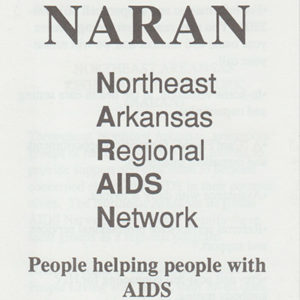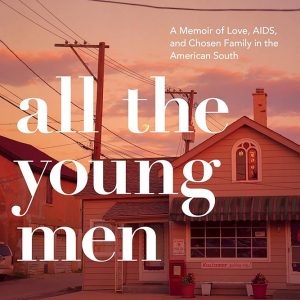calsfoundation@cals.org
AIDS
By 2007, a cumulative 4,119 Arkansans had been diagnosed with Acquired Immunodeficiency Syndrome (AIDS), the disease caused by the Human Immunodeficiency Virus (HIV), with 196 of those cases being newly diagnosed in that year. Of all cases diagnosed in Arkansas, more than eighty percent were among men, fifty-seven percent were among whites, and forty percent were among African Americans. However, among cases newly diagnosed in 2007, the majority (fifty-five percent) were among African Americans, with only thirty-seven percent of new cases being among whites. This trend follows national rates of proportionally more cases being diagnosed among African Americans and other minorities. Of those 4,119 diagnosed with AIDS, more than 2,000 were people living with AIDS as of the end of 2007. A total of 1,834 people with AIDS in Arkansas had died by the end of 2007. The majority (fifty-three percent) of AIDS cases in Arkansas were most likely transmitted through male-to-male sexual conduct. Other methods of transmission that presented themselves among a large number of those cases were heterosexual contact and injection drug use.
The first cases of AIDS in the United States were identified by clinical investigators in New York and California in 1981. By 1984, researchers were able to identify HIV as the cause of full-blown AIDS. In 1983, a Little Rock (Pulaski County) man in his early twenties became the first Arkansan to die of AIDS-related pneumonia. Because little was known about HIV and AIDS in the early days of the disease, public reaction to the epidemic included discrimination and stigma against the populations who were at risk for the disease—namely bisexual and homosexual men. In Arkansas, the gay rights movement suffered a major setback in the mid-1980s largely due to the emergence of HIV and AIDS. Another controversy in Arkansas concerning HIV infection was the Arkansas prison blood scandal, in which plasma from prisoners in Arkansas jails was sold to several countries around the world. By 1994, reports of plasma recipients being infected with HIV by blood from Arkansas prisons emerged from Canada and England, leading to Arkansas becoming the last state to cease selling plasma from prisoners.
The struggle to provide services for people with AIDS in Arkansas has often been met with considerable opposition due to the controversial nature of the disease. In the late 1980s, then-head of the Arkansas Department of Health, Dr. Joycelyn Elders, introduced controversial plans to distribute contraceptives to public school students. Eventually, her efforts resulted in the establishment of several public school health clinics that distribute condoms and promote public awareness of HIV/AIDS, as well as a state mandate that all schools include a sex education program in their curricula.
Further controversy concerning HIV/AIDS in Arkansas came to light during former governor Mike Huckabee’s unsuccessful candidacy for president in 2008. Huckabee was criticized by the media for his responses to a questionnaire concerning HIV/AIDS that he completed as a candidate for the U.S. Senate in 1992. The questionnaire responses included negative comments about homosexuality and a belief that all people with AIDS should be isolated from the public. Huckabee later said that he was confused at the time of the questionnaire and that he was putting public safety above political correctness.
In 1990, the federal Ryan White Comprehensive AIDS Resources Emergency (CARE) Act was signed into law. It provides funding to states and other public or private nonprofit entities that serve people with HIV/AIDS to develop, organize, coordinate, and operate more effective and cost-efficient systems for the delivery of healthcare and other services to underserved individuals affected by HIV. The act was reauthorized in 2000, and an off-shoot, the Ryan White Treatment Modernization Act, passed in 2006. The Treatment Modernization Act provides Arkansas with additional funding for “core medical services” for people with HIV/AIDS. Another part of the Ryan White CARE act provides Arkansas with funding to provide economic assistance for rent, utilities, transportation, health insurance, food, and nutritional supplements for people infected with HIV.
In 1996, Arkansas began participating in the federally funded AIDS Drug Assistance Program (ADAP), which provides medications to low-income individuals who are infected with HIV disease. In 2001, then-governor Huckabee signed Act 235, allowing for the first time state dollars to be spent for HIV medications for low-income individuals. Still, the ADAP program in Arkansas often had waiting lists of people living with HIV in need of financial assistance to pay for their medications. In March 2006, the waiting list reached eighty-nine people, prompting Huckabee to allocate $660,000 to alleviate the wait for getting help from the ADAP.
Several organizations in the state have provided provide services for people with AIDS. The largest such organization was the Arkansas AIDS Foundation, started in Little Rock in 1985. This group provided case management, medication services, dental services, nutrition services, counseling, and education for people living with AIDS, as well as testing and counseling services for the public, prior to its closure in 2019. Similar services were provided by South Arkansas Fights AIDS, based in El Dorado (Union County). The Arkansas Department of Health HIV/STD/Hepatitis C Section provides information on HIV/AIDS for the general public, healthcare providers, community-based organizations, policy makers, and the media.
In January 2008, a seventeen-member Arkansas HIV/AIDS Minority Task Force was formed by Governor Mike Beebe as authorized by Act 842 of 2007 to examine ways to improve HIV/AIDS treatment and prevention among the state’s minority populations. Now that people with HIV/AIDS are living longer due to medications and other measures, more services will undoubtedly be needed to keep Arkansans with the disease healthy.
For additional information:
Arkansas Department of Health HIV/STD/Hepatitis C Section. http://www.arkansashivstd.com (accessed May 17, 2023).
Arkansas AIDS Foundation. https://justdetention.org/service/arkansas-aids-foundation/ (accessed May 17, 2023).
Elders, Joycelyn. Joycelyn Elders, MD: From Sharecropper’s Daughter to Surgeon General of the United States. New York: Morrow, 1996.
Haimson, Chloe E., Jessica T. Simes, John M. Eason, and Jienian Zhang. “The Impact of Carceral Church and Healthcare Organizations on HIV/AIDS Incidence in Arkansas.” SSM – Population Health 21 (March 2023). doi:10.1016/j.ssmph.2023.101355 (accessed May 17, 2023).
Hardy, Benjamin. “Public Defender.” Arkansas Times, May 12, 2016, pp. 13–19. Online at http://www.arktimes.com/arkansas/public-defender/Content?oid=4403896 (accessed May 17, 2023).
Hopkins, Jim. “Going Home.” Arkansas Times, September 23, 1993, pp. 13–15.
“‘I’ve buried over forty people in my family’s cemetery…’” Interview with Ruth Coker Burks, StoryCorps. http://storycorps.org/listen/ruth-coker-burks-and-paul-wineland/ (accessed May 17, 2023).
Koon, David. “The Cemetery Angel.” Arkansas Times, January 8, 2015, pp. 14–19. Online at http://www.arktimes.com/arkansas/ruth-coker-burks-the-cemetery-angel/Content?oid=3602959 (accessed May 17, 2023).
Luo, Michael. “Parole Case and ’90s AIDS View Trail Huckabee.” New York Times. December 9, 2007, pp. 1, 39.
Peacock, Leslie. “Fear AIDS, Not My Child.” Arkansas Times, August 4, 1994, pp. 11–13.
———. “HIV Goes to School.” Arkansas Times, November 29, 1996, pp. 8–9.
Stanford, Barbara Dodds. “Not to Die in Vain.” Arkansas Times, August 1986, pp. 36–38, 55–57.
State Health Facts. Kaiser Family Foundation. http://kff.org/state-category/hivaids/ (accessed May 17, 2023).
Helen Cole
Brooklyn, New York
 Burks, Ruth Coker
Burks, Ruth Coker Divergent Prosperity and the Arc of Reform, 1968–2022
Divergent Prosperity and the Arc of Reform, 1968–2022 Health and Medicine
Health and Medicine Hildreth, James Earl King
Hildreth, James Earl King AIDS Brochure
AIDS Brochure  All the Young Men
All the Young Men  Ruth Burks
Ruth Burks 



Comments
No comments on this entry yet.